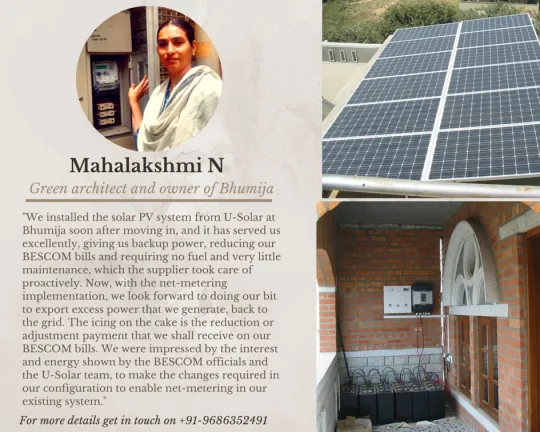
If you thought sustainability
does not pay, here’s an example to show that it can! Bhumija, a residence in
HSR layout, has been built on strong principles of sustainable living and
recycling and has now got a bi-directional
meter installed along with its existing rooftop solar PV system to export excess
solar power to the grid.
The Rooftop Solar PV system was
designed and installed at the building in the year-2011. The client was looking for solar to be the
primary source of power for her residence and also to provide back-up during
power outages. A 2 kW battery based system was designed for the residence with
~5hrs of back-up. The system currently powers lights, fans, televisions, a refrigerator,
a washing machine, a music system, computers and sump tank pumps. Only a few appliances
like the microwave oven and the bore-well water pump at the residence are not
connected to the solar PV system.
The 2 kW battery based system has
Premier Solar Modules of 12 nos of capacity 170Wp, charge controller by Phocos
MPS45 (45A), BESCOM empaneled Studer Innotec Inverter of 2.2 KVA @48V, Sakthi
batteries of 300@Ah@48V and other safety devices like lighting arrestor, earth-pit
and surge protection devices (SPD) on both the AC and DC sides to ensure smooth
operation of the system. The client follows all necessary practices of energy
efficiency at home. However, during the day, once the batteries are completely
charged, most of the excess solar power is wasted as the residence has very
little daytime load.
Recently, the Karnataka State
Government announced the “Net-Metering” policy. This policy allows anyone with
a large, shadow free roof to install a rooftop solar PV system and export excess
solar energy (after meeting their own needs of consumption) to the grid. The
client wanted to explore the option of installing the net-meter at her residence to see if she could sell the excess solar power which was being wasted
into the grid.
The Team at U-Solar was able to
get an opportunity to work along with the highly motivated team at BESCOM to understand
the steps needed to implement this first of its kind net-meter for a battery
based system in Bangalore. The system was successfully commissioned on 15/May/2015.
The whole process took approximately 45 days to implement.
The inverter was pre-programmed
to prioritize charging of the batteries through solar, then supply the loads,
and then export the excess solar power to the grid. The system has exported ~30
units to date.
We would like to thank BESCOM for their invaluable
support in helping us install the net-meter for our client’s residence. To
understand more about the Karnataka net-metering policy please click on the
link http://usolar.tumblr.com/post/115235346185/net-metering-is-here


